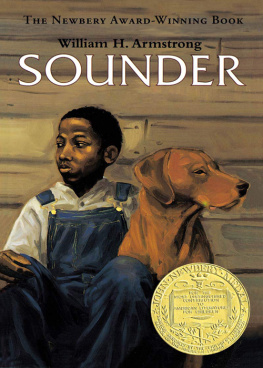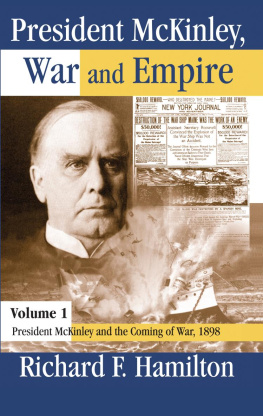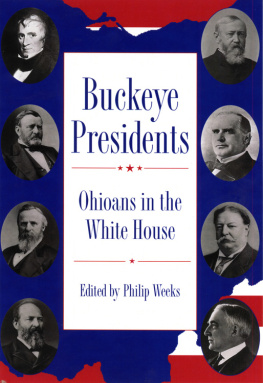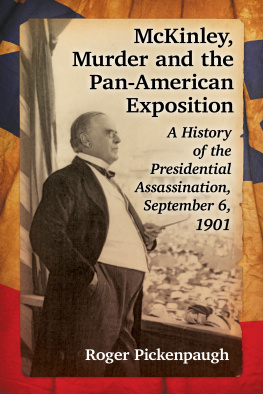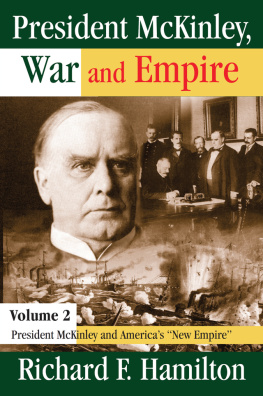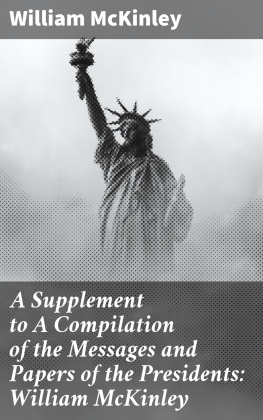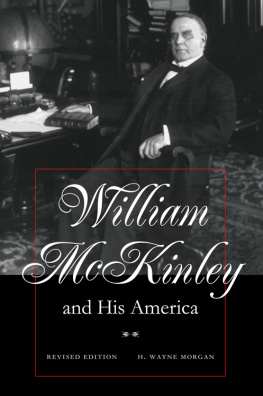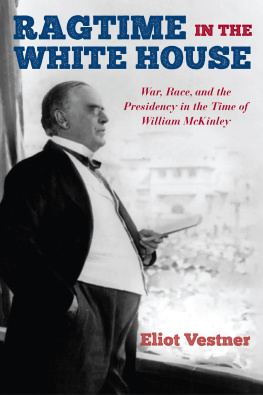2000 by The Kent State University Press, Kent, Ohio 44242
All rights reserved
Library of Congress Catalog Card
Number 99-048531
ISBN 0-87338-657-4
Manufactured in the United States of America
07 06 05 04 03 02 01 00 5 4 3 2 1
Frontispiece: Private William McKinley Jr. Courtesy of the Stark County Historical Society, Canton, Ohio.
Library of Congress Cataloging-in-Publication Data Armstrong, William H. (William Howard), 1932Major McKinley: William McKinley and the Civil War / William H. Armstrong.
p. cm.
Includes bibliographical references and index.
ISBN 0-87338-657-4 (pbk.: alk. paper)
1. McKinley, William, 18431901. 2. McKinley, William, 18431901Military leadership. 3. SoldiersUnited StatesBiography. 4. United States. ArmyBiography. 5. PresidentsUnited StatesBiography. 6. OhioHistoryCivil War, 18611865. I. Title.
E711.6.A76 2000
973.88092dc21
[B] 99-048531
British Library Cataloging-in-Publication data are available.
TO Gloria WITH LOVE
ILLUSTRATIONS 
AND MAPS ILLUSTRATIONS
Frontispiece
The Author at the McKinley Monument, Canton, Ohio
William McKinley Jr. before the Civil War
Major Rutherford B. Hayes
Sergeant McKinley by James Edward Kelly
1862 Recruiting Notice
Second Lieutenant William McKinley Jr.
McKinley as a Staff Officer
Major General George Crook
McKinley Announcing General Sheridans Return
McKinley Voting with Generals Sheridan and Crook
Major General Winfield Scott Hancock
Major General Samuel Sprigg Carroll and Staff
McKinley at Washington, D. C, in 1865
1896 Political Cartoon
The War Room in the White House
1900 Political Cartoons
MAPS
Ohio and West Virginia
The Eastern Theater of the Civil War
W illiam Allen White, the editor of the Emporia (Kansas) Gazette, could not fathom William McKinley. He found him a handsome man, with a matinee idols virility, but try as he might, he could see only the surface of the man, and he questioned whether there was anything significant underneath. Observing McKinley on a campaign swing through Kansas, White found him too polite, too meticulous. His Prince Albert coat was never wrinkled, his white vest front never broken. He was gentle but always, it seemed to me, carefully calculated. He was unreal.
Some years later, after meeting McKinley at his Canton, Ohio, home and in the White House, White still could not find what he called the real man back of that plaster cast which was his public mask. He was convinced that McKinley was destined for a statue in a park, and was practicing the pose for it. He had somewhere back in his youth or young manhood, possibly as a soldier in the war, buttoned himself up, and had become almost unconsciously the figure that stands now in Canton not far from his front doorWilliam McKinley in bronze.
If only White could have known McKinley thirty years earlier, when he was a soldier in the war, before he buttoned himself up. He would have found a very different man: a carefree young private on sentry duty who allowed a tall, thin officer to pass and then called out to a friendin the officers hearingSay Jake did you ever see such a clothes pin of an officer as that fellow?; a staff officer who, caught up in the excitement of a nearby cavalry charge, left the side of his commanding officer to join the charge and had to be reprimanded for his courageous but unauthorized conduct; a youth so captivated by a young and beautiful damsel in Maryland that some of his friends were seriously alarmed about his state of mind. If White had known McKinley then, he would have realized that,
This is the story of an eighteen-year-old youth who enlisted as a private and marched in the ranks but whose abilities soon caught the attention of his officers and then of his commander, Rutherford B. Hayes, who obtained a commission for him and added him to his military staff. McKinley later served on the staffs of four other general officers and ended his service as adjutant of a division and a brevet major. He was the last of the Civil War veterans to reach the White House and the only one who had served in the ranks.
It is the story, too, of the war as he knew it: hard mountain marches and ruthless guerrilla warfare in West Virginia; crowded train rides and long marches back and forth between West Virginia and the battlefields in the East; long processions of the mule-drawn supply wagons he oversaw as a commissary sergeant and quartermaster; and bloody battles at Carnifex Ferry, South Mountain, Antietam, Cloyds Mountain, Lynchburg, Kerns-town, Berryville, Opequon, Fishers Hill, and Cedar Creek. By the wars end, only 131 of the more than 2,000 Union regiments had more men killed in action or dead of wounds than McKinleys regiment, the 23d Ohio Volunteer Infantry.
To understand the young soldier and his war is to understand better the mature man, for McKinleys military service colored his entire career. Service in the same army as those he called black allies, who must neither be deserted nor forsaken, led him to champion the civil rights of the freed slaves long after they had been abandoned by others. At the same time, his service as a Union soldier gave him the credibility to grasp the hands of the former Confederate soldiers and promote reconciliation between North and South. And his firsthand observations of such men as George Crook, Winfield Scott Hancock, and Philip Sheridan gave him the experience and confidence he exhibited as commander in chief in the war with Spain. Those who knew him well recognized the significance of his military career by calling him alwayswhether he was county prosecutor, member of Congress, governor, or presidentMajor McKinley.
Growing up as I did in Stark County, Ohiowhere McKinley settled after the warmeant that William McKinley has been a part of my life as long as I can remember. The McKinley Monument in Canton was only a few miles away, and the park adjacent to it was a favorite place for family picnics. A small hospital stood where McKinleys home had once stood; our oldest son was born in that hospital. I was fascinated by the stories told by my mothers cousin C. L. Riley, a teacher at McKinley High School in Canton. When he was nine years old, his family had taken him to Canton frequently to witness the famous Front Porch Campaign of 1896. The weeds grew high in our corn that year, he said; events in Canton were too exciting to stay at home on the farm. After McKinley became president, Rileys great-uncle Washington Kelley (my great-great-uncle) took him to visit McKinley. During the Civil War, Kelley had been quartermaster of the 9th Indiana Volunteer InfantryAmbrose Bierces regimentand had known McKinley from their service together in West Virginia. He renewed his friendship with the president at McKinleys home on North Market Street in Canton, while Riley, sitting on a little rocking chair McKinley had thoughtfully brought out for him, watched and listened, captivated by their conversation about the war. When McKinley died, my grandparents took Riley with them to view the presidents body at the Stark County Courthouse. Later, they found a place across the street from the McKinley home, where they sat and watched the dignitaries come and go. Finally, they hurried to Westlawn Cemetery to see the president laid to rest.


